Tap into the collective power of influential business and NGO pioneers to create new strategies and
tactics to build a more socially and environmentally conscious world.

Tap into the collective power of influential business and NGO pioneers to create new strategies and
tactics to build a more socially and environmentally conscious world.
Hammad Naqi Khan
Company/NGO Name:
WWF–Pakistan
Region, Country:
Pakistan
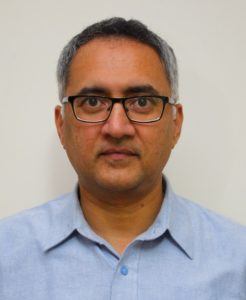
WWF-Pakistan’s mission is to conserve nature and ecological processes by:
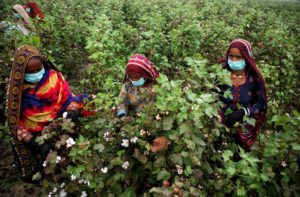
Workers pick cotton on a field in Salehput, Sukkur, Pakistan, on Wednesday, Oct. 30, 2013
I can proudly share many innovative projects being implemented by WWF-Pakistan with high social and environmental value. Keeping in mind cotton’s global importance as a commodity and a footprint, WWF-Pakistan took a step and launched “PSCI (Pakistan Sustainable Cotton Initiative)” in 2005 in collaboration with WWF – Int’l and IKEA, to grow Better Cotton through reduced/need-based use of Agrochemicals. The training and awareness regarding farm inputs has grown the aspiration of cotton farmers to control pests by natural or biological measures, hence reducing its overall impact on the environment. Similarly, with the involvement of private sector, the importance of market transformation was introduced which led to a multi-stakeholder ‘Better Cotton Initiative’ being launched in 2005 with the objective of globally raising the sustainability standard of conventional cotton and making it available in large volumes to mainstream retailers at the same price as conventional cotton. At the moment, WWF-Pakistan under Better Cotton Standard System (BCSS) is working with around 145,375 farmers, facilitating its implementation over an area of around 500,000 hectares at the moment in major provinces of Pakistan.
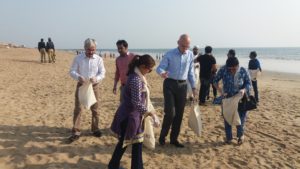
Ambassador EU during beach cleaning at Sandspit beach
WWF-Pakistan ensures involvement of local communities, in addition to other key stakeholders, in all its initiatives, throughout the planning, implementation, monitoring, and post-project sustainability phases. The project has helped establish community-based organizations (CBOs) for men and women, for better mobilization and has contributed towards augmenting local livelihoods through building vocational skills of women and trainings on better agricultural practices.
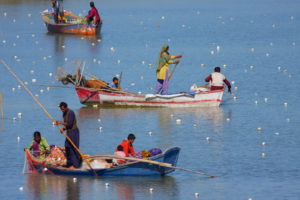
WWF-Pakistan is collaborating with the Government of Pakistan on developing an exciting new project for funding from the Green Climate Fund. The Indus River is the lifeline of water-stressed Pakistan, but it also delivers catastrophic floods that are predicted to grow in size and frequency with climate change. Pakistan has relied on hard-engineering infrastructure solutions to manage floods that provide limited resilience and benefits with high costs. This project proposes to introduce ecosystem-based adaptation to address the Indus floods and enhance the resilience of vulnerable communities and Pakistan as a whole.
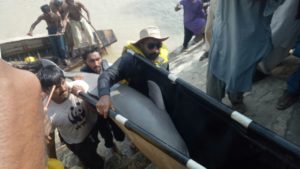
The success of the cotton project for me is like a dream come true. No one in the network was working on this crop. Additionally, it was critical for our economy. I contacted someone at WWF International head office and they agreed and gave us a small funding grant to start the project. We started with a couple of villages in Vihari, Punjab in 1999. In 2005 due to WWF’s global partnership with IKEA, I gave the corporation a presentation about our project in Pakistan. Cotton is their second biggest raw material so they agreed to support us. Later, this project was replicated in India in 2006. “Moving forward the Better Cotton Initiative (BCI) was started which set global standards. The first bale under the project came out in 2010 from Pakistan and it made international headlines.
“This programme has been expanded to India, China, Africa, Brazil, Turkey, Australia, the USA and supported by the world’s leading brands and retailors.”
It was a proud moment. It also showed that when Pakistanis put their mind to something they are able to deliver quality outcomes. Also, in 2011, I was selected to lead WWF’s global cotton and textile work based in the Netherlands. I was also one of the ten senior professionals selected from the entire network to take part in the WWF initiated senior leadership programme: WWF Next.
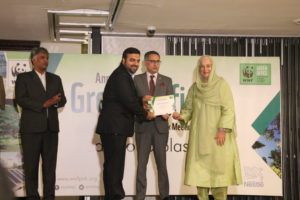
Federal Minister for Environment – on right
Bonus Questions:
Climate change is one of the most serious threats our planet is facing. For Pakistan, the situation is much worse, as we are one of the top ten countries affected by climate change, according to the German watch Climate Change Performance Index.
WWF-Pakistan has been implementing many initiatives not only to adapt to climate change but also to empower communities to be climate resilient. We are working with communities from villages in Gilgit-Baltistan in the mountainous north to coastal communities in Keti Bundar in the south, providing them with alternative livelihood options, clean energy sources and educating them about the issue and how it will affect them in the future. We have also conducted various multi-hazard risk mapping and vulnerability assessments.
Equally important is to educate the public and WWF-Pakistan is spreading awareness through social media.
In Pakistan where a large majority of the population is living below the poverty line, it is rather challenging to convince communities to care for the environment around them. In absence of basic amenities, communities are dependent on natural resources for their survival.
To address this challenge, all WWF-Pakistan projects are implemented in close collaboration with communities who are educated on how their survival and prosperity actually depends acutely on the health of ecosystems we all share. Once they understand the concept, they take ownership of the natural resources around them, indicating that even when WWF project ends, the locals continue to be guardians of nature around them.
WWF-Pakistan achieves its goals in partnership with many stakeholders including businesses. Corporates are engaged through various initiative including Corporate Membership Programme where companies are engaged in tree plantations and beach cleanings, etc and the Green Office Programme where companies are supported in reducing carbon emissions of their offices. Other initiatives include working with industries to reduce their water input.
To learn more, please visit WWF-Pakistan and Hammad Naqi Khan on social media:
WWF-Pakistan
Website · Facebook · Twitter · Instagram
Hammad Naqi Khan
All photos kindly provided by WWF-Pakistan